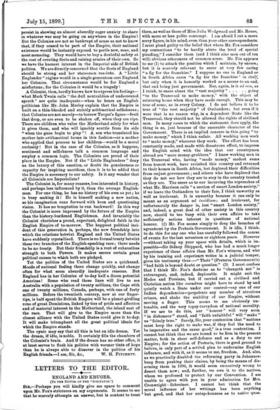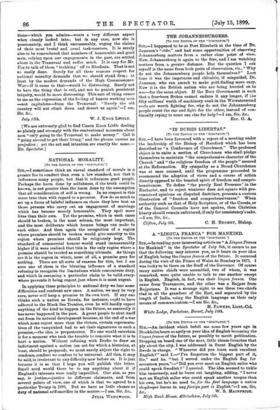LETTERS TO THE EDITOR.
ENGLAND AND KRUGER.
[TO TEl EDITOR OF TfIR "SPECTAT0R:]
Bin,—Perhaps you will kindly give me space to comment upon Mr. Fox's strictures on my arguments. It seems to me that he scarcely attempts an answer, but is content to treat
them, as well as those of Miss Julia Wedgwood and Mr. Rouse, with more or less polite contempt. I am afraid I cut a more sorry figure, in his mind, even than your other correspondents. I must plead guilty to the belief that where Mr. Fox considers my contentions "to be hardly above the level of special pleading," I consider them (and I think nine men out of ten will) obvious utterances of common-sense. Mr. Fox appears to me (1) to attack the position which I maintain, by sneers ; but it is scarcely relevant to sneer at very few caring "a fig for the franchise." I suppose no one in England or in South Africa cares "a fig for the franchise" in itself, but only when it is honestly worked as a means to an end, that end being just government. Nor, again, is it ad rem, as I think, to sneer about the "vast majority" . . . . . going "to the Transvaal to make money," with the object of returning home when they have made enough. This may be true of some, as in every Colony. I do not believe it to be true of "the vast majority" of Outlanders; but even if it were that is no reason why, in a dependent State like the Transvaal, they should not be allowed the rights of civilised men. In many cases to which the statement does apply, the thing is so, just because of the execrable character of the Government. There is an implied censure in this going "to make money," which I think unfair. All working men work to "make money," wherever they work. The effort has been constantly made, and made with disastrous effect, to impress the English mind with the idea that our countrymen abroad are "mere money-grubbers." I know working men in the Transvaal who, having "made money," modest sums from honest work, have revisited this country and returned to their homes in South Africa, but deplored their difficulties from unjust government ; and others who have deplored that they do not see how they are to stay in the country treated as they are. The sneer as to our incurring the reproaches of what Mr. Harrison calls "a section of smart London society," if we leave the Outlanders to their fate, I think unworthy as well as irrelevant. It is unworthy because it can only be meant as an argument ad invidiam ; and irrelevant, for unfortunately the danger is, lest "smart London society," and, indeed, a great deal of other society in this country now, should be too busy with their own affairs to take sufficiently serious interest in questions of national honour. (2) Mr. Fox seems simply to deny the breaches of agreement by the Pretoria Government. It is idle, I think, to do this for any one who has carefully followed the course of events for the last seventeen or eighteen years. However —without taking up your space with details, which is im- possible—Sir Sidney Shippard, who has had a much longer experience of these affairs than Mr. Fox's witness, and who by his training and experience writes in a judicial temper, gives his testimony thus :—" Their" (Pretoria Government's) "bad faith is beyond doubt or question." (3) I must confess that I think Mr. Fox's doctrine as to "changeth not" is extravagant, and, indeed, deplorable. It might snit the Medea and Persians, but if carried out a civilised and Christian nation like ourselves might have to stand by and quietly watch a State under our control—say one of our Indian dependencies—perpetrate any number of atrocious crimes, and shake the stability of our Empire, without moving a finger. This seems to me obviously un- tenable, and the very topsy-turvydom of national morality. If we are to do this, our " honour " will very soon "in dishonour" stand, and "faith unfaithful" will " make " us "falsely true." Surely, Sir, your contention that "nations must keep the right to make war, if they feel the need to be imperative and the cause good," is a true contention. I cannot but think that we are bound to be firm in the present matter, both in sheer self-defence and as a duty to our Empire; for the action of Pretoria, there is good ground to believe, is only part of a settled plan to undermine English influence, and with it, as it seems to me, freedom. And, also, as we practically disabled the reforming party in Johannes- burg from pushing their claims, by being the means of die- arming them in 1896, it would seem excessively wrong to desert them now; and, further, we owe it to the natives, whom we professed to protect by our Convention. I am unable to agree with you in your admiration for Mrs. Cronwright - Schreiner. I cannot but think that the moral influence of her writings has been anything but good, and that her outspokenness as to native clues. tions—which you admire—wears a very different aspect when closely looked into; but in any case, now she is passionately, and I think unreasonably, urging the claims of their most brutal and cruel task-masters. It is surely also to be remembered that numbers of honourable and good men, relying upon our engagements in the past, are settled about in the Transvaal and suffer much. It is easy for Mr. Fox to talk of them " trekking " off to Rhodesia. That is not so easily done. Surely for all these reasons respect for national morality demands that we should stand firm ; at least by the modest demands of the High Commissioner. War—if it came to that—would be distressing. Surely not to hate the thing that is evil, and not to punish persistent iniquity, would be more distressing. This sort of thing comes to me as the expression of the feeling of honest working men —not capitalists—from the Transvaal : "Surely the old country will not climb down and desert us again."—I am, Sir, Ac., [We are extremely glad to find Canon Knox Little dealing so plainly and strongly with the conventional nonsense about men "only going to the Transvaal to make money." Call it "going abroad to get their living," and the phrase carries no prejudice ; yet the act and intention are exactly the same.— ED. Spectator.]







































 Previous page
Previous page